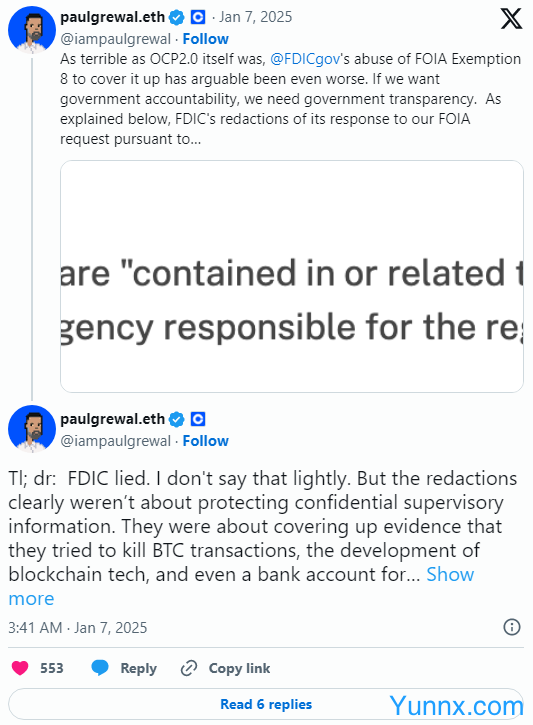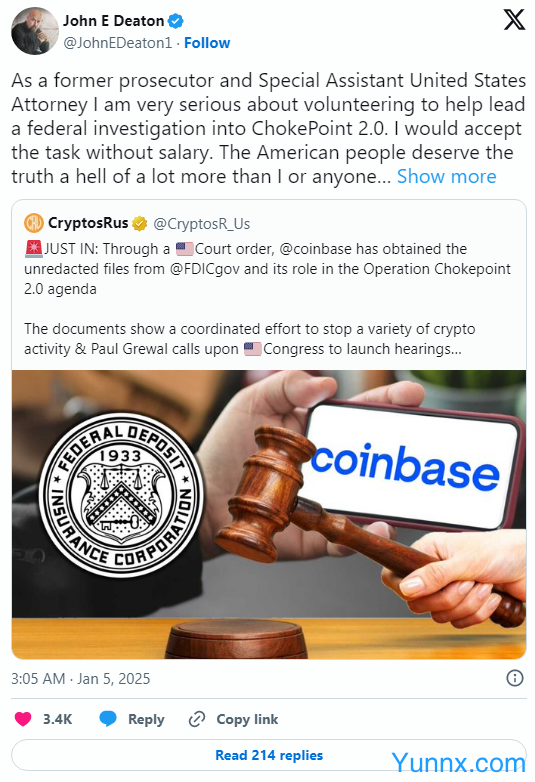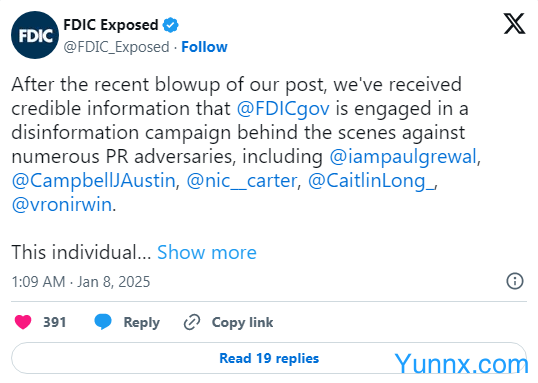Coinbase CLO: FDIC was trying to cover up its actions aimed to debank crypto clients
Jan 13, 2025
Dogecoin
On Jan. 6, 2025, Coinbase CLO Paul Grewal took to X to continue his coverage of the ongoing process of legal encounter with the FDIC that admitted to sending “pause letters” to the banks, urging them to stop services to crypto clients. According to Grewal, the FDIC abused FOIA exemption 8 in an attempt to hide court-compelled info.
Coinbase sued the Federal Deposit Insurance Corporation to enforce the Freedom of Information Act. Initially, the request was denied by the FDIC. According to Grewal, the Federal Deposit Insurance Corporation failed to provide all the court-compelled documents timely and added more documents only after additional legal pressure. More than that, the FDIC used FOIA exemption 8 to heavily redact the revealed documents (so-called “pause letters” to financial institutions) without lawfully justified reason.
Exemption 8 of the Freedom of Information Act is set to protect the matters “contained in or related to examination, operating, or condition reports prepared by, on behalf of, or for the use of an agency responsible for the regulation or supervision of financial institutions.”
Why did the FDIC redact disclose documents?
An excuse to hide certain details in the disclosed documents was that the reveal of this info would have caused “reasonably foreseeable harm” to the recipients of these letters. Allegedly, the names of the institutions, the specific operations, and other details, if made public, will damage the relations between the banks in question and the regulator (i.e., the FDIC). Interestingly enough, the letters weren’t even confidential until September 2022, when the FDIC began to add notifications that banks should keep the letters secret.

Some of the information initially redacted became available on January 4. Grewal claims that the newly revealed data doesn’t harm the recipients of the pause letters and that the FDIC made up the excuse to cover up an ongoing Operation Choke Point 2.0, a colloquial name of the series of efforts by the FDIC, the Federal Reserve, and other institutions to block services for clients performing transactions associated with cryptocurrencies, religious groups, clients associated with African countries, and other law-abiding customer groups.
Senator and former prosecutor John E. Deaton expressed support for the efforts in stopping Operation Choke Point 2.0 and stated he is eager to lead an investigation against the officials involved for free.

In the X post, Deaton stresses the prominence of the Choke Point 2.0 in the ongoing case against Ripple. He warns that the precedent of “unelected bureaucrats… arbitrarily denying access to essential financial infrastructure” goes far beyond the cryptocurrency sector.
The “pause letters” recap
The letters sent by the FDIC to financial institutions were aimed at stopping banks from providing services to clients associated with cryptocurrency activity. The letters noted that the services may not be provided until the advice from the regulator, but it’s not known if this advice has ever been provided. In most cases, clients were left without consistent explanations over the reasons for the service cease. At several instances, banks admitted that they blocked accounts due to “unexpected activity” or things like this.
The 25 disclosed letters were sent between 2022 and 2023. The types of activity that financial institutions were urged to stop for an indefinite amount of time included the following:
Bitcoin-backed lending operations
NFTs and cryptocurrency storage by the banks
Onboarding of the decentralized “ecosystems”
Products that allow clients to buy or sell cryptocurrencies
Private and public blockchain settlement networks
Issuance of permissioned stablecoins
Stablecoins depositories
Issuing debit cards that support Bitcoin cash back
Other known cases include the blocking accounts of cryptocurrency hedge funds.
Another 2022 document issued by the FDIC is the internal memo, in which it demands the FDIC-supervised banks that are going to launch their own crypto-related products to inform the regional director of the FDIC beforehand and provide all the necessary information for examination.
Is Operation Choke Point 2.0 real?
There are several accounts of cases where banks were stopping to provide services to clients associated with cryptocurrency. If this is not enough to confirm the existence of the operation, we can add the FDIC’s letters. Although they don’t necessarily urge banks to completely close clients’ accounts, they created problems by indefinite account blocks, creating uncertainty for U.S. entrepreneurs in the crypto sector. If one doubts that Operation Choke Point 2.0 is real, we may state that the FDIC’s recommendations of termless closures of the bank accounts of companies that don’t violate the law are real.
The activists writing about Operation Choke Point 2.0 claim the FDIC is engaging in the covert disinformation campaign started against them.

As the battle continues, the new facts will shed light on the true outlook of the alleged unlawful anti-crypto efforts, and we will learn if the FDIC’s actions were rather an example of caution or outright hostility.
Recommend Apps









